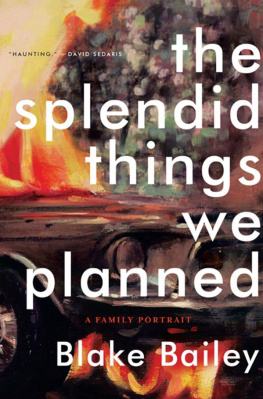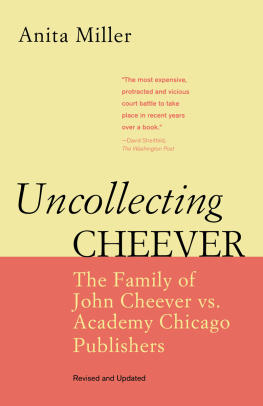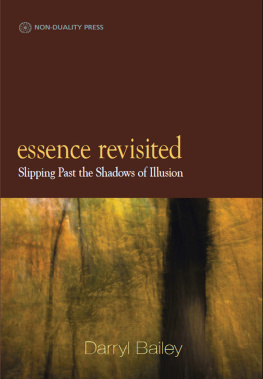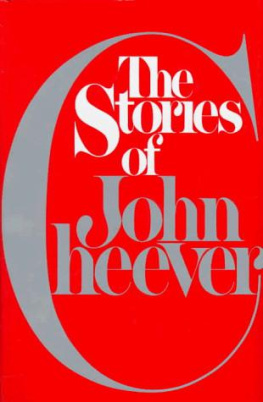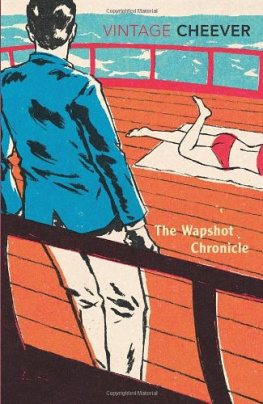Blake Bailey - Cheever: A Life
Here you can read online Blake Bailey - Cheever: A Life full text of the book (entire story) in english for free. Download pdf and epub, get meaning, cover and reviews about this ebook. publisher: Alfred A. Knopf, genre: Non-fiction. Description of the work, (preface) as well as reviews are available. Best literature library LitArk.com created for fans of good reading and offers a wide selection of genres:
Romance novel
Science fiction
Adventure
Detective
Science
History
Home and family
Prose
Art
Politics
Computer
Non-fiction
Religion
Business
Children
Humor
Choose a favorite category and find really read worthwhile books. Enjoy immersion in the world of imagination, feel the emotions of the characters or learn something new for yourself, make an fascinating discovery.

- Book:Cheever: A Life
- Author:
- Publisher:Alfred A. Knopf
- Genre:
- Rating:3 / 5
- Favourites:Add to favourites
- Your mark:
- 60
- 1
- 2
- 3
- 4
- 5
Cheever: A Life : summary, description and annotation
We offer to read an annotation, description, summary or preface (depends on what the author of the book "Cheever: A Life " wrote himself). If you haven't found the necessary information about the book — write in the comments, we will try to find it.
Cheever: A Life — read online for free the complete book (whole text) full work
Below is the text of the book, divided by pages. System saving the place of the last page read, allows you to conveniently read the book "Cheever: A Life " online for free, without having to search again every time where you left off. Put a bookmark, and you can go to the page where you finished reading at any time.
Font size:
Interval:
Bookmark:
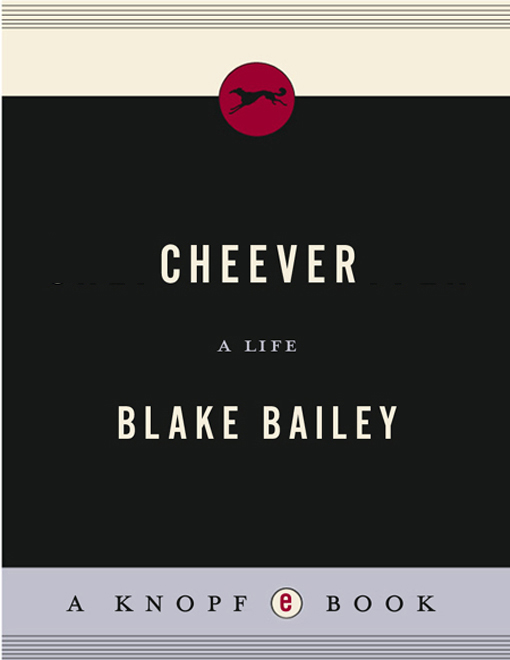
ALSO BY BLAKE BAILEY
A Tragic Honesty: The Life and Work of Richard Yates
EDITED BY BLAKE BAILEY
John Cheever: Complete Novels
John Cheever: Collected Stories and Other Writings

For Mary, Marlies, and Amelia
I've never intended to be patronizing. As a child I was told to remember, at all times, that I was a CHEEVAH. I thought this bullshit had cured me.
John Cheever to Frederick Exley
Fred, remember you are a Cheever.
John Cheever's advice to his younger son
I am nothing and everything is a nothing and I want to play out the role to the end; and if I am less than nothing I am a wayward boy, angry at Mummy and Daddy and a little queer to boot; and how does this square with the image of a cheerful man of forty-five who has been given everything in the world he desires but a degree of unselfconsciousness.
John Cheever, Journals
it is too much to ask that people who spend very much time in a world of their own, as all writers do, should immediately and invariably grasp what is going on in this one.
William Maxwell
CHAPTER ONE
CHAPTER TWO
CHAPTER THREE
CHAPTER FOUR
CHAPTER FIVE
CHAPTER SIX
CHAPTER SEVEN
CHAPTER EIGHT
CHAPTER NINE
CHAPTER TEN
CHAPTER ELEVEN
CHAPTER TWELVE
CHAPTER THIRTEEN
CHAPTER FOURTEEN
CHAPTER FIFTEEN
CHAPTER SIXTEEN
CHAPTER SEVENTEEN
CHAPTER EIGHTEEN
CHAPTER NINETEEN
CHAPTER TWENTY
CHAPTER TWENTY-ONE
CHAPTER TWENTY-TWO
CHAPTER TWENTY-THREE
CHAPTER TWENTY-FOUR
CHAPTER TWENTY-SIX
CHAPTER TWENTY-SEVEN
CHAPTER TWENTY-EIGHT
CHAPTER TWENTY-NINE
CHAPTER THIRTY
CHAPTER THIRTY-ONE
CHAPTER THIRTY-TWO
CHAPTER THIRTY-THREE
CHAPTER THIRTY-FOUR
CHAPTER THIRTY-FIVE
CHAPTER THIRTY-SIX
CHAPTER THIRTY-SEVEN
CHAPTER THIRTY-EIGHT
CHAPTER THIRTY-NINE
CHAPTER FORTY
CHAPTER FORTY-ONE
CHAPTER FORTY-TWO
CHAPTER FORTY-THREE
CHAPTER FORTY-FOUR
CHAPTER FORTY-FIVE
CHAPTER FORTY-SIX
CHAPTER FORTY-SEVEN
CHAPTER FORTY-EIGHT
CHAPTER FORTY-NINE
CHAPTER FIFTY
O N A PRIL 27, 1982 , less than two months before his death from cancer, John Cheever appeared at Carnegie Hall to accept the National Medal for Literature. While his colleagues stood and cheered (John had nothing but friends, said Malcolm Cowley), Cheever hobbled across the stage with the help of his wife, Mary. Months of cancer treatment had left him bald and pitifully frail, shrunken, but his voice was firm as he spoke. In his journal he'd referred to this occasion as his Exodus and reminded himself that literature was the salvation of the damnedthe lesson of his own life, surely, and the gist of what he said that day at Carnegie Hall. A page of good prose, he declared, remains invincible. As John Updike remembered, All the literary acolytes assembled there fell quite silent, astonished by such faith.
Seven years beforehis marriage on the rocks, most of his books out of printCheever had tried drinking himself to death. He was teaching at Boston University, beset by ghosts from his awful childhood in nearby Quincy: There were whole areas of the city I couldn't go into, he said later. I couldn't, for example, go to Symphony Hall because my mother was there. Updike was living on the opposite end of Back Bay at the time, and when he'd visit the small furnished apartment Cheever had taken near the university (no more lived-in than a bird perch) he'd notice the first dusty page of Falconer stuck in the typewriter. One night he came to take Cheever to Symphony Hall, and was disconcerted when the older man emerged naked on his fourth-floor landing while the door swung shut behind him. Fortunately, there was no automatic locking mechanism, and Updike assumed the role of a dutiful if slightly exasperated son: [Cheever's] costume indicated some resistance to attending symphony but I couldn't imagine what else, and I primly concentrated on wedging him into his clothes. That winter Cheever went for long, staggering walks along Commonwealth Avenue, rarely wearing an overcoat despite freezing weather (his father had warned him that overcoats make one look Irish). Finally he sat next to a bum and the two huddled together, sharing a bottle of fortified wine. When a policeman threatened to arrest him, Cheever gave the man a look of bleary, aristocratic reproach: My name is John Cheever, he drawled (Cheevah). You're out of your mind.
He came to himself in the Smithers Alcoholism Treatment and Training Center on East Ninety-third Street in Manhattan, where for twenty-eight days he shared a bedroom and bath with four other men. He couldn't remember leaving Boston. As for Smithers, it was grim: he was told that a man had recently jumped out the window in the ward where he slept; he was taunted in group therapy for pulling a fancy accent. Displaying much grandiosity and pride, one of his counselors noted. Denying and minimizing grossly. The staff was particularly struck by Cheever's tendency to laugh at inappropriate moments: little giggles would erupt while he recalled, say, a time he'd hurt his family. On the telephone with his daughter, however, Cheever would become tearful and say he couldn't bear it another day. And yet he sensed that an early departure would amount to suicideand he wanted to live, oddly enough; he wanted to finish Falconer. Cheever's is the triumph of a man in his sixties, Bernard Malamud said of his colleague's miraculous resurrection. Here he'd been having a dreadful time but he stayed with it. And through will and the grace literature affords, he saved himself. After his wife drove him home from Smithers on May 7, 1975, Cheever never took another drink.
Less than two years later, he appeared on the cover of Newsweek over the caption A Great American Novel: John Cheever's Falconer. (He'd also been the subject of a 1964 Time cover story, Ovid in Ossining.) After reading Falconer, the article proclaimed, one has the ecstatic confidence of finishing a masterpiece. Large claims were made for Cheever's place in world literature: Long before Donald Barthelme, John Barth and Thomas Pynchon began tinkering with narrative conventions, Cheever had unobtrusively disrupted the expected shapes of fiction. As was the case with Faulkner in France, Cheever has been unexpectedly recognized and honored in Russia for the corrosive criticism of American civilization his understated fiction implies. The fact that all but one of Cheever's story collections were out of print was described as a scandal of American publishing.
This was remedied the following year, 1978, when The Stories of John Cheever became one of the most successful collections ever published by an American writer. The book remained on the New York Times best-seller list for six months and won the Pulitzer, the National Book Critics Circle Award, and the American Book Award. Cheever (appalled) was introduced as the Grand Old Man of American Letters on a Boston talk show. The bookish middle class, it seemed, identified en masse with Cheever's vision of suburban alienation; his corrosive criticism of their culture was mitigated, perhaps, by what the author himself wryly called his childlike sense of wonder.
Font size:
Interval:
Bookmark:
Similar books «Cheever: A Life »
Look at similar books to Cheever: A Life . We have selected literature similar in name and meaning in the hope of providing readers with more options to find new, interesting, not yet read works.
Discussion, reviews of the book Cheever: A Life and just readers' own opinions. Leave your comments, write what you think about the work, its meaning or the main characters. Specify what exactly you liked and what you didn't like, and why you think so.


